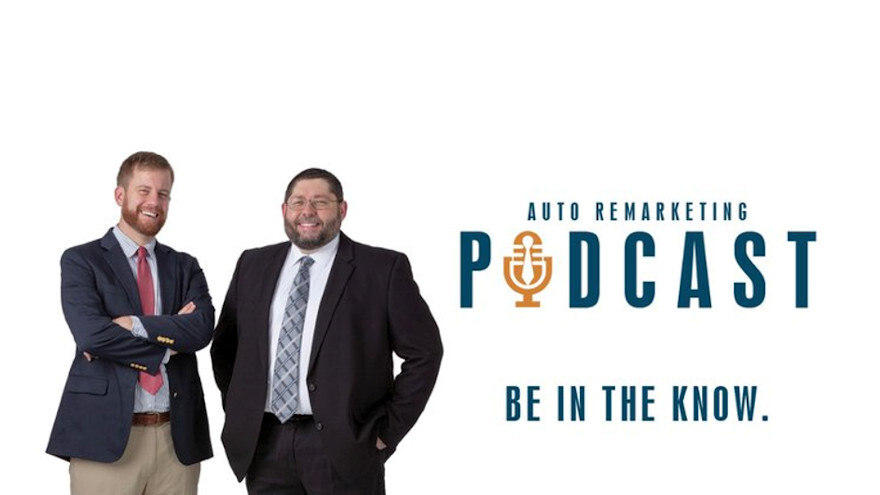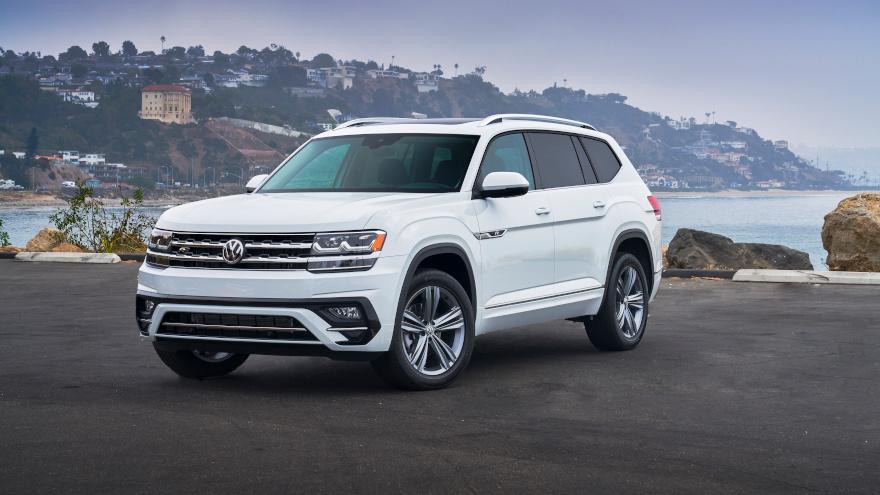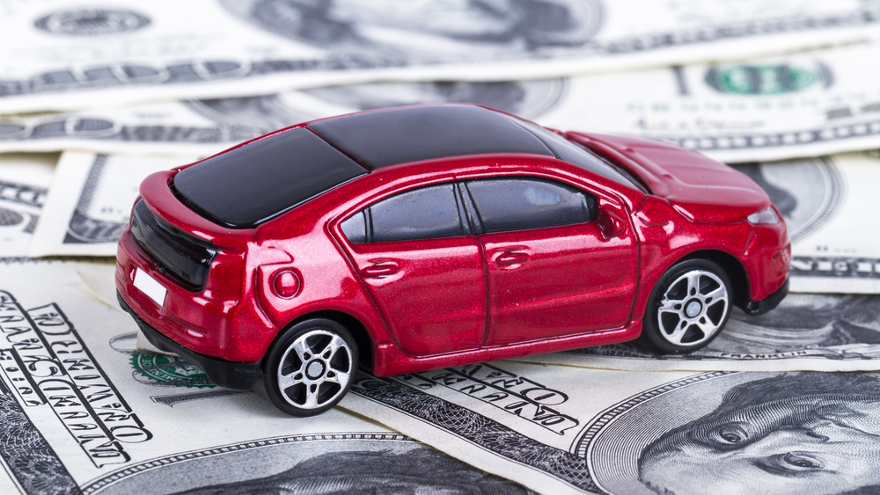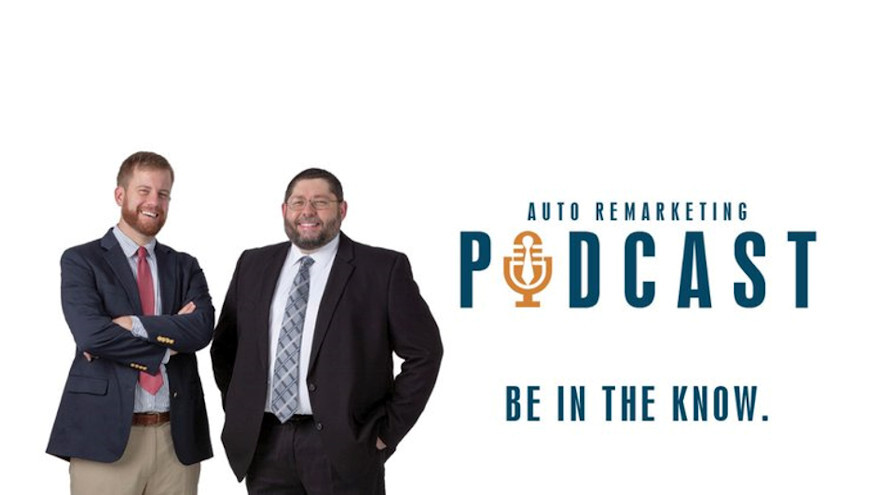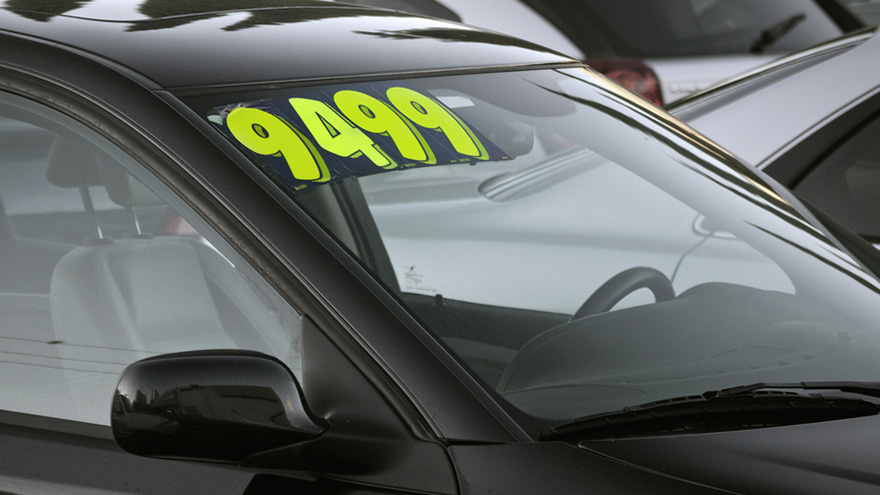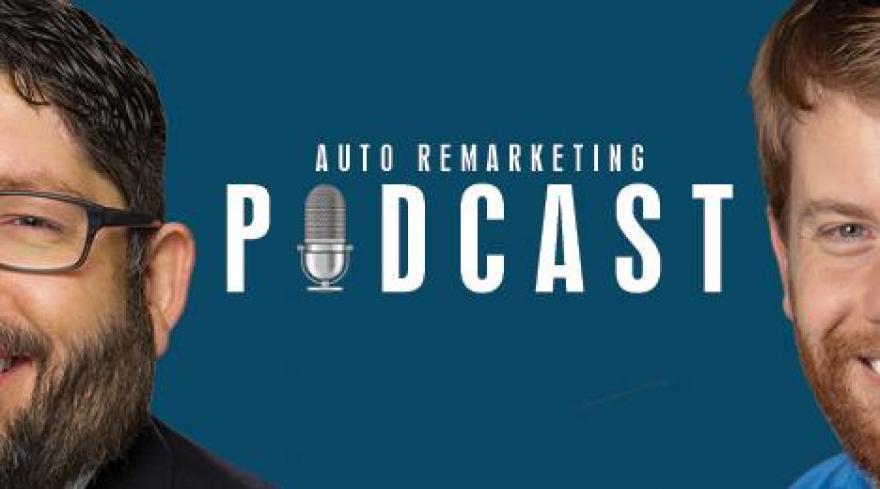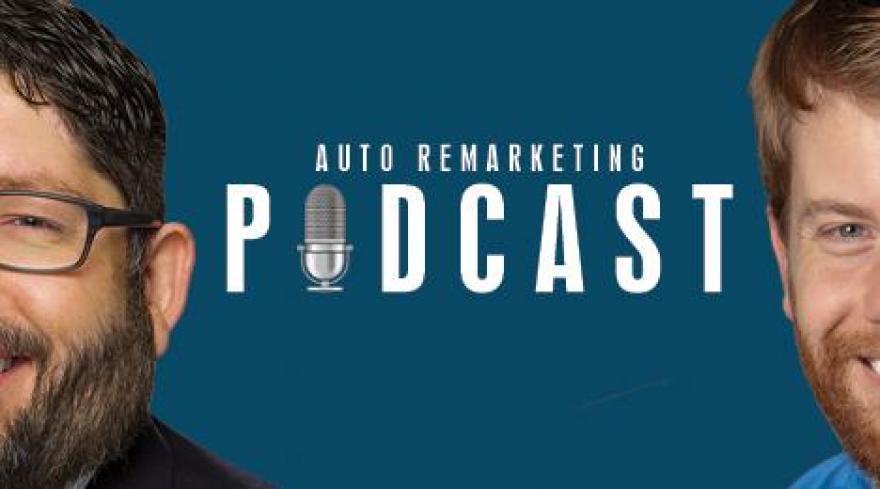Tennessee shares a border with eight states, including Kentucky, Virginia, North Carolina, Georgia, Alabama, Mississippi, Arkansas and Missouri.
And according to Experian Automotive’s first quarter data, the Volunteer State edged out several of its bordering neighbors for the highest rate of used vehicles sold in Q1 with financing attached.
Tennessee led the nation in Q1 with …
Read more
For the second year in a row, Cherokee Media Group’s Nick Zulovich tracked down Cox Automotive chief economist Jonathan Smoke after appearing at the Non-Prime Auto Financing Conference hosted by the National Automotive Finance Association.
The conversation covered auto financing, used-vehicle prices, inflation and, of course, some musical references, too.
To listen to the conversation, click on the link available below, or visit the Auto Remarketing Podcast page.
Download and subscribe to the Auto Remarketing Podcast on iTunes or on Google Play.
Volkswagen dealerships have another option when working with their service-drive customers who encounter repair costs higher than they expected and cannot pay with available cash.
As a result, participating stores collectively already are seeing millions in additional service revenue.
On Wednesday, Sunbit, the buy now, pay later (BNPL) technology for everyday needs and services, announced it has been selected by Volkswagen of America as the preferred partner of the OEM’s eConnect Flexible Payment Program.
After evaluating several financing providers throughout last year, the company said Volkswagen endorsed Sunbit as its preferred partner in offering access to flexible payment plans to its service and maintenance customers.
Sunbit said one in four of the 636 Volkswagen dealerships were already using this technology. The company highlighted how much the solution can benefit both dealerships and their customers.
In 2020, 96% of Volkswagen customers who applied for a payment plan through Sunbit were approved, resulting in $3.3 million in revenue for Volkswagen dealerships.
“After testing Sunbit against other financial solutions last year, they were the clear winner,” said Jon Meredith, who is a part of dealer business development at Volkswagen of America. “Not only were dealers tremendously satisfied with their performance, but the approval of 96% of Volkswagen customers ultimately drove higher customer satisfaction and loyalty.
“That’s why we’re working to get Sunbit technology into more dealerships to serve more customers,” Meredith continued in the news release.
As part of this partnership, Volkswagen is offering dealerships using Sunbit’s technology benefits like subsidizing a three-month no-interest program from July until the end of September. This program will enable qualified Volkswagen customers to spread their payments for service or maintenance across three months interest-free, without early pay-off penalties, or added fees.
In collaboration with Sunbit’s field operations team, Volkswagen also will promote training and competitions for its service advisors to offer Sunbit technology to customers who visit their service center.
“We are honored to be chosen as Volkswagen’s preferred partner,” said Chad Beasley, Sunbit’s head of automotive OEM. “We’re proud to count Volkswagen among the OEMs endorsing our services. We are happy to see that our technology solutions helped more drivers stay on the road safely and securely.
“Unexpected expenses like servicing your car can be stressful. Volkswagen’s eConnect program with Sunbit can help alleviate that for nearly everyone who applies, while contributing to the dealership’s bottom-line,” Beasley went on to say.
Tennessee and Vermont are polar opposites based on at least one statistic from Experian’s Q2 2020 State of the Automotive Finance Market report.
Turns out the states well known for country music and maple syrup, respectively, are at the top and the bottom of Experian’s data set for the amount of used-vehicle financing originated during the second quarter.
Tennessee led the way with 78.2% of financing connected to a used vehicle. Vermont landed on the other end of the analysis at 57.7%.
Here are the top 10, according to Experian:
Tennessee: 78.2%
Mississippi: 75.4%
Indiana: 75.2%
Alabama: 74.5%
Kansas: 73.0%
Kentucky: 73.0%
Michigan: 72.7%
Iowa: 72.2%
Wisconsin: 72.2%
Georgia: 71.3%
Idaho: 71.3%
Meanwhile, here are the bottom 10 from Experian’s report:
Vermont: 57.7%
District of Columbia: 59.6%
New Hampshire: 60.3%
Nevada: 60.5%
Delaware: 61.2%
California: 61.4%
Florida: 61.4%
New Jersey: 61.4%
Louisiana: 61.5%
West Virginia: 62.1%
Jake Levant sees how the vehicle purchasing and financing process has improved for the consumer, but the vice president of marketing and partnerships at Lightico also emphasized that dealerships and finance companies still have some work to do to cut down on the friction buyers still experience.
In this podcast, Levant explores how the coronavirus pandemic impacted the improvement journey at Lightico, one of the firms highlighted among this year’s Emerging 8.
To listen to the episode, click on the link available below, or visit the Auto Remarketing Podcast page.
Download and subscribe to the Auto Remarketing Podcast on iTunes or on Google Play.
Fitch Ratings spotted another place where improving vehicle sales has been good for the automotive industry.
Analysts reported this week that dealer floorplan (DFP) asset backed securities (ABS) trust performance metrics — including monthly payment rates (MPR) — have rebounded on the back of new U.S. auto sales rising in May and early June off of the lows in April, tempering rating pressures entering the historically stronger summer sales season.
However, Fitch Ratings acknowledged that dealers continue to face a challenging operating environment with a rise in coronavirus cases in many parts of the U.S. Analysts noted revenues and profit levels remain suppressed as the new-vehicle seasonally adjusted annual rate (SAAR) is below 13 million units through May.
While the asset performance outlook for the sector is negative, Fitch reiterated that it has not taken any negative ABS rating actions to date, reflecting available credit support and conservative dealer default analysis.
Fitch explained its derived net loss levels for DFP ABS platforms assume more than 50% of dealers default, some of which then resume sales based on ratings and financial metrics such as revenues, profits and absorption rates. This results in modeled dealer default levels of 15 percent to 25 percent for trusts, 10 times to 20 times actual historical dealer defaults.
Analysts noted that there have been no reported defaulted dealers in the ABS trusts to date arising from the coronavirus-related lockdowns across Fitch-rated DFP ABS networks.
“Many dealers across the U.S. remained open for the most part during the pandemic and also moved to online sales to make up for lost foot traffic, which helped to mitigate weakened overall vehicle demand during March and April. Dealer networks also benefitted from government support under the Paycheck Protection Program,” Fitch said in its latest update.
“Dealer networks have received solid support from auto manufacturers and captive lenders, helping to contain credit issues at dealers,” Fitch continued, referencing incentives from captives such as interest-free periods, which drove sales up from less than 10 million new units in April to 12.6 million in May.
Additionally, Fitch mentioned DFP lenders for the most part provided three-month deferrals on capital line interest payments, one of the highest dealer costs, and also deferred curtailment payments, alleviating pressure until the summer when sales and revenues will potentially rebound.
“These helped keep dealer costs down when needed most and have likely supported dealers’ ability to pay down existing debt, benefitting MPRs,” analysts said.
Fitch went on to note the recent new-vehicle sales rebound in May and June and prior production halt resulted in lower inventories, particularly for popular models such as trucks, pickups and SUVs.
Analysts recapped that wholesale used-vehicle values plummeted to around 15% to 20% in March and April, stabilizing in May and improving going into the latter half of June, “positive for dealers as they rely mostly on profits from used sales.”
Analysts then said, “Considering double-digit unemployment, Fitch expects consumers to opt for cheaper, used vehicles during 2020.”
Fitch added trust MPRs declined dramatically in the month of April, but no trust saw MPRs fall below 17%, “showing a high degree of resiliency for the sector, and have started to improve in May.”
Analysts closed by mentioning trusts use MPR performance as a barometer of an issuer’s continuing ability to service and pay notes. Fitch noted MPR early amortization triggers generally look to three-month average MPRs and range from 15% to 30% depending on the trust.
BMW Financial Services and Daimler revised their trust triggers, extending the average range to six months from three months, according to Fitch.
Ally Financial provided some insight on Monday in connection with potential buyers arriving at your dealership showroom or store website, especially individuals who already might be weary from new-vehicle sticker shock.
Ally pointed out used vehicles are increasingly popular with Americans as consumers turn to the used market for more affordable options, but a recent survey found many Americans still hold outdated notions about used vehicles.
According to an Ally Financial survey of more than 2,000 American adults conducted by The Harris Poll, U.S. consumers think used vehicles are older and less expensive than they really are.
On average, Americans think the average age of a used vehicle at the point of sale is 6.6 years, but data from a 2019 Edmunds Used Vehicle Report puts the average age at 4 years. Additionally, consumers in the Ally survey believed that the price of a used vehicle, on average, at the time of sale is $9,860 when it is more than twice that amount, $20,664, according to Edmunds.
Approximately one-third of Americans (31%) in Ally’s survey thought the average used vehicle was more than twice as old, 8 years or older, as the actual average age, and only one in 10 Americans correctly said the average purchase price of a used car is more than $20,000.
“Today’s used vehicles feature better quality and options than ever before. A 75,000-mile used vehicle is in an entirely different category than it was just a few years ago,” said Matt Arnold, senior regional vice president of auto finance at Ally Financial.
“Today’s used models have many of the same tech and safety features that new cars offer, but at a significantly lower price point. They’re a smart alternative for all budgets and lifestyles, particularly when you consider the average new-car price is approaching $38,000,” Arnold continued.
According to the Ally survey, consumer opinions on the average price of used vehicles depended on a range of factors:
• Homeowners said used vehicles cost almost $3,000 more than renters did ($10,604 versus $7,876).
• The higher the household income, the more expensive they estimated used vehicles were. On average, Americans with household income of:
—Under $50,000 said used vehicles cost $7,684
—$50,000-$74,999 said used vehicles cost $9,225
—$75,000-$99,999 said used vehicles cost $10,735
—More than $100,000 said used vehicles cost $11,938
• On average, millennials/Gen Z (ages 18-34) estimated the lowest average vehicle cost of any age group, while Americans ages 45-54 estimated the highest average vehicle cost, mirroring the progression of income across a career. On average, those ages:
—18-34 said used vehicles cost $8,513
—35-44 said used vehicles cost $9,567
—45-54 said used vehicles cost $10,907
—55-64 said used vehicles cost $10,806
—65 and older said used vehicles cost $10,385
“Even though many Americans are buying used cars, the survey shows too many people lump all used cars with old clunkers,” Arnold said. “It’s time to let go of old stereotypes. Adding used vehicles to your consideration list can be a smart move. You’ll either end up with a lot more car for your money, or a lot more money in your wallet.”
The survey was conducted online by The Harris Poll on behalf of Ally Financial from May 7-9 among 2,012 U.S. adults ages 18 and older.
On Friday, HyreCar announced the pricing of an underwritten registered public offering of 3.5 million shares of its common stock at a public offering price of $3 per share.
The company looking to leverage on a marketplace for ridesharing revealed even more in its filing with the Securities and Exchange Commission, acknowledging the depths of its recent losses as well as non-binding relationships with both Lyft and Uber.
Nonetheless, HyreCar is looking to generate $10.5 million through this offering — or $12.075 million if the underwriter exercises its option in full — with the net proceeds for expanded sales and marketing as well as customer support and technology investments to continue to grow its platform.
Northland Securities is acting as the sole book-running manager for the offering. HyreCar also granted the underwriter a 30-day option to purchase up to an additional 525,000 shares of its common stock at the public offering price, less the underwriting discount, to cover over-allotments, if any.
The offering is expected to close on or about Tuesday, subject to customary closing conditions.
Update on string of losses & tangible book value
When that closing happens, the funds will arrive with HyreCar incurring operating losses each year and every quarterly period since inception back in 2014.
At the close of the first quarter in both 2019 and 2018, HyreCar acknowledged in its SEC filing that operating losses totaled $1,728,889, and $1,574,057, respectively.
“We expect our operating expenses to increase in the future as we expand our sales and marketing efforts and continue to invest in research and development of our technologies,” the company said in the SEC document. “These efforts may be costlier than we expect, and we may not be able to increase our revenue to offset our increased operating expenses.
“Our revenue growth may slow or our revenue may decline for a number of other reasons, including reduced demand for our services, increased competition, a decrease in the growth or size of the ride-sharing or car-sharing market or any failure to capitalize on growth opportunities,” HyreCar continued.
“Any failure to increase our revenue as we grow our business could prevent us from achieving or maintaining profitability. If we are unable to meet these risks and challenges as we encounter them, our business, financial condition and results of operations may suffer,” the company added.
HyreCar acknowledged that it faces “intense competition” stemming from rapid changes in technology, customer requirements, industry standards and frequent new service introductions and improvements.
“We anticipate continued challenges from current competitors, as well as by new entrants into the industry,” HyreCar said. “If we are unable to anticipate or effectively react to these competitive challenges, our competitive position could weaken, and we could experience a decline in our growth rate or revenue that could adversely affect our business and results of operations.
As of March 31, HyreCar reported its historical net tangible book value stood at $4,653,105, or $0.38 per share of common stock. The company explained net tangible book value per share represents the book value of its total tangible assets less the book value of our total liabilities, divided by the number of shares of our common stock outstanding.
HyreCar pointed out the public offering price of $3.35 per share is based the last reported sale price of our common stock on the Nasdaq Capital Market on July 12.
Relationships with Lyft and Uber
Along with offering sensitive financial details, HyreCar also divulged its relationships with Lyft and Uber through the SEC filing.
“Although we have deployed drivers and cars to the systems of both Uber and Lyft since our operations began in 2015, there is currently no formal contractual relationship in place with either company,” HyreCar said. “On May 17, 2017, we announced an arrangement with Lyft that allows us to activate our drivers through Lyft’s sign-up portal. However, this is an oral arrangement that has not been memorialized in a written agreement. Consequently, each of these relationships could be discontinued at any time.
“In addition, virtually all of our revenue is generated by cars and drivers operating on both the Uber or Lyft platform and therefore this concentration represents a high degree of risk to us and to potential investors,” HyreCar continued.
“Our business and future growth is significantly dependent on the continued success of each of Uber, Lyft and other software-based systems that have come into the marketplace to compete with standard taxicab transportation organizations,” HyreCar added.
“While the effect of those companies has been to decrease the cost and therefore increase the utilization of ride-sharing, there can be no assurance that consumer utilization of these systems will continue to grow, or that competition and the resulting price pressure will not undermine the viability of these types of systems, thereby adversely affecting our business,” HyreCar went on to say.
HyreCar also mentioned Lyft and Uber when mentioning that its unique peer-to-peer structure could be duplicated by another technology company.
“Although to date neither Uber nor Lyft have endeavored to develop a peer-to-peer system to match drivers and car owners as we are doing, there can be no assurance that either one of these companies or other competitors subsequently entering the marketplace will not endeavor to do so, and there can be no assurance that such competition will not have a negative impact on our business,” HyreCar said.
“Furthermore, although several attempts to match up fleets of cars owned by operators with Uber and Lyft drivers have failed, there can be no assurance that other entities will not enter the marketplace on this basis with economic and logistical models that solve the problems that caused this failure,” HyreCar went on to say.
With modern vehicles containing complex components that can be quite expensive to repair or replace, the value proposition for including an extended warranty can be even more compelling for dealership finance managers to offer their customers.
GWC Warranty area vice president of strategic alliances Wendy Pratt shared some recommendations with Nick about how stores can help their customers protect their vehicle purchase.
The full episode can be found below.
Download and subscribe to the Auto Remarketing Podcast on iTunes or on Google Play.
You can also listen to the latest episode in the window below.
Catch the latest episodes on the Auto Remarketing Podcast homepage and on our Soundcloud page.
Please complete our audience survey; we appreciate your feedback.
Along with his legal expertise as director of compliance for Reynolds Document Solutions, Terry O’Loughlin also possesses deep knowledge of history, especially in connection with paper and how it’s used for financing contracts used by dealers.
Nick recorded this episode during this year’s National Automotive Finance Association annual conference in Plano, Texas, as O’Loughlin offered some perspective about how much the retail installment sales contract has changed over the past several decades from a single sheet to the numerous pages it now is.
The full episode can be found below.
Download and subscribe to the Auto Remarketing Podcast on iTunes or on Google Play.
You can also listen to the latest episode in the window below.
Catch the latest episodes on the Auto Remarketing Podcast homepage and on our Soundcloud page.
Please complete our audience survey; we appreciate your feedback.


